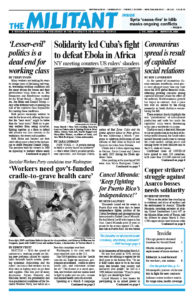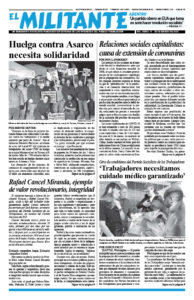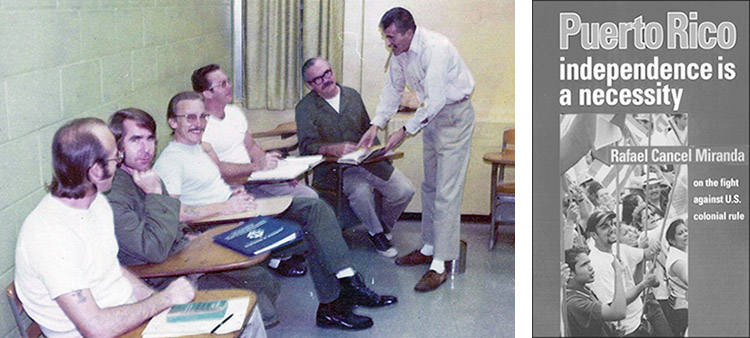Thousands turned out for events in Puerto Rico over three days to honor independence fighter, partisan of the Cuban Revolution and uncompromising internationalist Rafael Cancel Miranda. He died March 2 at 89 at his home in San Juan. Cancel Miranda spent 28 years in prison for his actions against U.S. colonial rule in Puerto Rico. He was buried in his hometown of Mayagüez March 8.
He was first jailed in 1948, serving two years for refusing to register for the draft prior to the Korean War. “To me it didn’t make sense to be in the same army that invades your country and massacres your people,” he said in a 1998 Militant interview. “If you’re going to fight, you should fight them.”
Cancel Miranda is best known for participating in an armed protest in Congress on March 1, 1954, along with Lolita Lebrón, Irving Flores and Andrés Figueroa Cordero. At 23, and a press operator at a shoe factory in New York City, he was the youngest of the group. They unfurled a Puerto Rican flag and shouted “Viva Puerto Rico libre!” before firing some shots, most into the air. A few congressmen were wounded.
The island has been a U.S. colony since 1898, when U.S. troops wrested control from Spain. Opponents of U.S. imperialist occupation were brutally repressed. On March 21, 1937, Cancel Miranda’s father and mother, supporters of Albizu Campos’ Nationalist Party, attended a peaceful rally in the city of Ponce that was attacked by cops on orders of U.S. Gen. Blanton Winship, killing 21 people and wounding 200.
In 1948 Washington imposed Law 53, which prohibited flying the Puerto Rican flag, singing patriotic songs and gatherings in support of independence. Yet in 1953, the U.S. government had Puerto Rico removed from the United Nations list of colonies, claiming the island was a “self-governing” territory.
The four Nationalists “decided to carry out a demonstration that would draw the world’s attention to the truth about Puerto Rico, that would tell the world that there were Puerto Ricans who were willing to die for our independence and that the U.S. government was fooling the United Nations and the world — including my people — with this so-called commonwealth,” Cancel Miranda told the Militant.
‘Proven right by history’
El Nuevo Día, the largest circulation daily in Puerto Rico and no friend of the fight for independence, noted that Cancel Miranda and others who rejected Washington’s claim that Puerto Rico was self-governing “were proven right by history.” Virtually no one today denies that Puerto Rico is a U.S. colony.
By the early 1970s there was a growing movement in the U.S., Puerto Rico and internationally to free the five Nationalists — the fifth being Oscar Collazo, arrested in 1950 after attacking the temporary residence of President Harry Truman. It was intertwined with the exploding opposition to the rulers’ war against the people of Vietnam, struggles for Black and Chicano liberation and for women’s equality.
Figueroa was freed in 1978. The remaining four were freed by President Jimmy Carter in 1979. They were greeted as heroes by tens of thousands in Chicago, New York and Puerto Rico.
The Cuban Revolution began while they were in prison. Cancel Miranda realized it was not just a change in faces, “but a true social transformation. I internalized it to the point that the Cuban revolution has become as important to me as the fight for the freedom of my people,” he said in the interview.
Cancel Miranda worked with the Socialist Workers Party to turn his interviews with the Militant into a pamphlet — Puerto Rico: Independence Is a Necessity — to get out the truth about the fight against U.S. colonial rule to workers here.
In an article he wrote for the Militant while still in prison, he said, “I think of myself as part of every struggle anywhere in the world in which people struggle for freedom, dignity, and a just socio-political-economic way of life.”
And that’s how he conducted himself to his death, joining picket lines of striking workers in Puerto Rico, speaking at meetings in the U.S., defending the Cuban Revolution, opposing U.S. imperialist intervention in Venezuela and Latin America. He was a prominent supporter of the fight to free the Cuban Five, revolutionaries framed up by Washington and imprisoned from 1998 until 2014.
“He came here to Humacao after Hurricane Maria” to support the work of Arecma, Rosalina Abreu said by phone March 7. Arecma, the community group she leads, had organized a communal dining area that served hundreds, in face of the criminal inaction by the U.S. and Puerto Rican governments.
Cuban President Miguel Díaz-Canel and Minister of Foreign Relations Bruno Rodríguez sent messages to Cancel Miranda’s family. Granma noted that he had always been true to his belief “that you arrive at your goal more rapidly standing than on you knees,” and that “he could always count on the friendship of the Cuban people and its central leaders, especially Fidel Castro.”
Cancel Miranda requested that flags not be lowered to half-mast. For independence fighters “the flags must always be held high, as high as possible,” he said.


